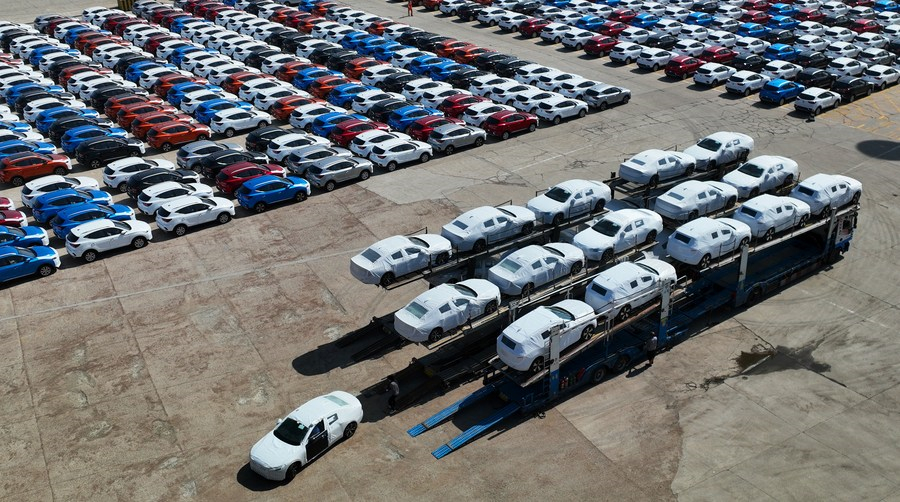China's Jiangsu ensures steady, high-quality growth in foreign trade

This aerial photo shows cars to be loaded for export at Lianyungang Port, east China's Jiangsu Province, May 9, 2023. [Xinhua/Geng Yuhe]
Since the start of 2023, east China's Jiangsu Province has rolled out measures to guarantee steady and high-quality growth in foreign trade. Not long ago, the province introduced 14 new measures to stabilize the scale and optimize the structure of foreign trade.
Foreign trade is seen as a barometer of economic development. The total imports and exports of Jiangsu, which is one of the country’s foreign trade powerhouses, has ranked second nationwide for 20 consecutive years.
Despite rising uncertainties in foreign trade, the province's exports stood at 1.33 trillion yuan ($183.8 billion) in the first five months of 2023, up 1.5 percent year on year, which was the result of the efforts of the local governments and enterprises to stabilize the overall performance of foreign trade.
This year, Jiangsu has vigorously visited the headquarters of multinational companies, with over 60 delegations going to countries and regions, including Europe, the U.S., Japan, South Korea, and Singapore for trade.
"Supporting enterprises in expanding their overseas markets is the first of the 14 new measures," said Zhou Xiaoyang, deputy director of the Jiangsu provincial department of commerce.
This year, the provincial government and municipal governments of Jiangsu have supported nearly 1,500 enterprises in participating in over 120 key exhibitions overseas, and provided them with subsidies of up to 80 percent of their booth fees, Zhou added. All 13 cities with subordinate districts in the province have formulated city-level policies to help enterprises expand their overseas markets.
While stabilizing the overall performance of foreign trade, Jiangsu has continuously optimized the structure of foreign trade and promoted trade in capital- and technology-intensive goods and services. According to the 14 new measures, the province needs to promote the innovative development of processing trade and support qualified enterprises outside the customs special supervision zones and the Jiangsu pilot free trade zone in conducting bonded maintenance business that is high-tech, high value-added, and environmentally friendly.
From January to May this year, Jiangsu's exports of solar cells, lithium-ion batteries, and new energy vehicles increased by 8 percent, 64.3 percent, and 541.6 percent to reach 44.84 billion yuan, 39.15 billion yuan, and 3.9 billion yuan, respectively.
During the same period, the province's trade with countries along the Belt and Road climbed 8.9 percent to reach nearly 600.7 billion yuan, and its trade with Latin America, the Middle East, and Africa rose by 9.6 percent, 18 percent, and 15.5 percent, respectively. In 2022, its trade with countries along the Belt and Road stood at 1.49 trillion yuan, up 13.1 percent, maintaining growth for seven consecutive years.
In recent years, the province has launched measures to help enterprises expand in emerging markets such as the Association of Southeast Asian Nations and countries along the Belt and Road, and support enterprises in leveraging the Regional Comprehensive Economic Partnership (RCEP) agreement to improve their competitiveness.
According to the 14 new measures, Jiangsu should make the best use of preferential policies of free trade agreements, including the RCEP agreement, and hold training sessions on the agreement.
























